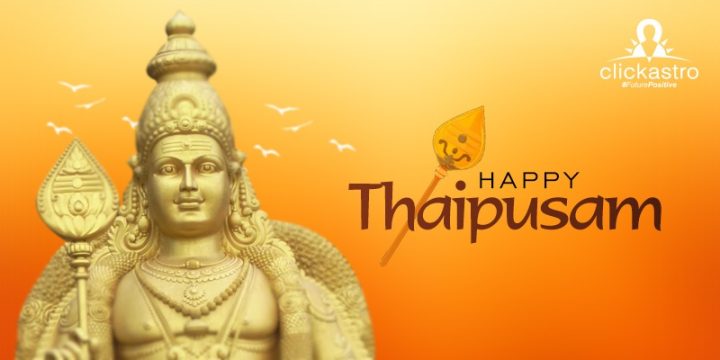Contents[hide]
உங்கள் தமிழ் ஜாதகத்தை முற்றிலும் இலவசமாகப் பெறுங்கள்
The name Thaipusam combines the names of the month (Thai) and the star (Pusam or Pushya). During this festival, the Pushya star is at its peak. This Hindu festival commemorates Lord Subramaniam’s victory over the asura (demon) Soorapadman and his brothers with the Vel (spear) given by Goddess Parvathi. On Thaipusam, devotees worship Lord Murugan (the other name of Lord Subramaniam), to gain his blessings and to destroy all the evil and bad traits in their life. On this day, Lord Murugan’s image is decorated and placed on a silver chariot, and taken in a procession. Lord Subramaniam is considered an embodiment of virtue, bravery, youth, and beauty, and is also believed to grant favors. Devotees pledge their devotion and to prove their gratitude to the Lord, they undergo self-mortification on this day. Some devotees also believe Thaipusam marks the birth of Lord Murugan; however, other sources advocate that Lord Murugan was born on Vaikhasi Vishakam, which falls in the Vaikashi month.Significance of Thaipusam 2024
Thaipusam is celebrated as a day of penance and thanksgiving to Lord Murugan (also known as Skanda, Karthikeya, and Subramaniam) for answering their prayers and granting them their desires. To fulfill one’s desires it is important to pay for past sins. Normally, upon fulfillment of their desires or wishes, the devotees vow to carry the kavadi for a period of one, three, or five years in a row. These desires may range from praying for offspring, success, and victory in academics or business, or even being cured of serious illnesses. Thaipusam festival witnesses several rituals and colorful parades accompanied by drums and chanting. The festival of Thaipusam 2024 is celebrated with gaiety in all the six temples dedicated to Lord Murugan. Get Your Yearly Horoscope 2024When is Thaipusam 2024?
Thaipusam 2024 Date and Thaipusam Timings are given as follows,Thaipusam 2024 – Thursday, 28th of January
- Sunrise January 26, 2024, 7:13 AM
- Sunset January 26, 2024, 6:05 PM
- Poosam Nakshathram Begins January 25, 2024, at 8:16 AM
- Poosam Nakshathram Ends January 26, 2024, at 10:28 AM
The Kavadi Attam
The Kavadi Attam or burden dance is a devotional act of sacrifice in the form of dance, food offerings, and self-mortification. The kavadi consists of a semi-circular canopy beautifully decorated with images of Lord Murugan, flowers, peacock feathers, and other decorative articles and is carried on the shoulders of the temple. The devotees perform the nadai payanam with bare feet with food offerings on the Kavadi. The walk to the temple may last more than a week depending on the location of the temple. The Palani Murugan temple is one of the most popular destinations and is considered a place of healing. It is believed that the statue of Lord Murugan at Palani was created by Bogar, an ancient Siddhar and devotee of Lord Murugan, with a mixture of numerous Siddha medicines. The heavily and intricately decorated kavadis are attached to the devotees with sharp skewers symbolizing the burdens carried by the devotees. The largest kavadi, also known as vel kavadi, requires the devotee to be pierced with 108 small spears (vels). The worshipers pierce their tongues, cheeks, and faces with sharp spears and are often driven into a trance-like state with chanting and drums. They often pierce their tongues and pin them through the cheeks which symbolizes that the devotee has given up his gift of speech. Check love compatibility level with your partner. It’s FREEWhat are the rituals of Thaipusam/Thaipooyam?
- Devotees of Thaipusam prepare 48 hours in advance through fasting and prayer. The kavadi-bearers perform elaborate rituals at the time of picking the kavadi and making offerings to Lord Murugan. They are required to practice celibacy and consume only pure, saatvik food once during the day. The kavadi-bearers must live a strict life denouncing all worldly activities and are required to dress up in yellow or orange clothing. During this time, the devotees must wash with cold water only and some may also choose to sleep on the floor.
- On the day of Thaipusam, the devotees shave their heads symbolizing the removal of ego/pride. They submit their crown (hair) to the lord in the ritual known as mudi erakuthal before undertaking the pilgrimage to the temple while engaging in various acts of devotion, like carrying kavadi. Carrying a pot of milk is the simplest form of kavadi. The extreme form includes self-mortification through piercing the tongue cheeks, or skin with vel skewers of various sizes and shapes. The act of piercing the vel through the tongue or cheek reminds the devotees constantly about Lord Murugan and also prevents them from speaking, which in turn requires immense endurance.
- Upon reaching the pilgrimage site, the kavadi-bearers lay down their kavadi and offer honey and milk which is poured on the deity symbolizing a form of thanksgiving. Devotees then offer yellow fruits and flowers to Lord Murugan. The metal implements used for self-mortification are then immediately removed and the wounds are treated with hot ash. It is surprising to note that the devotees show no sign of pain, blood, or scarring once the vels are removed. This reinforces the power of Lord Murugan in the minds of the devotees.
Legend of Lord Murugan and Soorapadman
Soorapadman was an asura born to the asura rishi Vajranaga and Varangi, an apsara. The couple had three sons and two daughters, after which Rishi Vajranaga went into meditation for centuries. Soorapadman performed a very long penance to Lord Shiva and was granted a boon by Lord Shiva that no one except Lord Shiva’s offspring born without Shiva’s union with a female, in any nature, could kill or defeat him. Soorapadman soon went around the mortal world-conquering it through war or by subjugation. Scriptures state that once Soorapadman tried to lift Mount Kailash, however, Lord Shiva pushed the mountain back into place and trapped Soorapadman underneath the mountain. The imprisoned Soorapadman recited the Shiva Tundan (hymns of Lord Shiva) in praise of Lord Shiva for thousands of years. As a result of his prayers, Lord Shiva ultimately blessed him and granted him an invincible sword and Atmalinga, a powerful linga to worship. Soorapadman then established an empire named Veera Mahendrapuri and distributed parts of his vast empire to his brothers. Meanwhile, his sister tries to get Indrarani as a mistress for Soorapadman. But a guard of Indrarani amputates the arm of Soorapadman’s sister. Angered by this, Soorapadman conquered heaven, imprisoned all devas, and tortured them. Devas who escaped from Soorapadman approached Lord Shiva and sought his help in vanquishing Soorapadman. Lord Shiva creates his son, Lord Murugan from the flames of his forehead. Lord Murugan marches toward Veera Mahendrapuri and vanquishes Soorapadman’s brothers Tarakasura and Simhamukha. He then graces Simhamukha to become his lion. Soorapadman refuses to surrender and in the final battle that ensues, Lord Murugan mortally wounds Soorapadman with his spear and Soorapadman asks for his glory to be spared. Lord Murugan grants his wish provided Soorapadman becomes his vahana (vehicle) forever. Soorapadman assumes the form of a peacock and becomes Lord Murugan’s vehicle. Soorapadman’s killing is celebrated with great pomp as Surasamharam in Tiruchendur, which is considered to be the final battleground of Lord Murugan and Soorapadman. உங்கள் தமிழ் ஜாதகத்தை முற்றிலும் இலவசமாகப் பெறுங்கள்Thaipusam Festival Dates from 2024 to 2028
- 2024 Friday, 26th of January
- 2025 Tuesday, 11th of February
- 2026 Sunday, 1st of February
- 2027 Saturday, 23rd of January
- 2028 Wednesday, 9th of February







